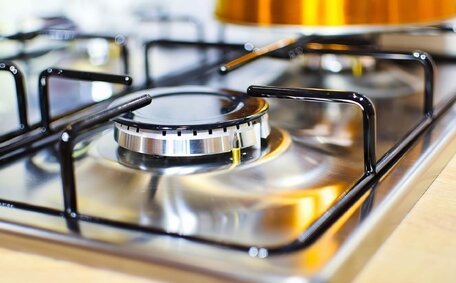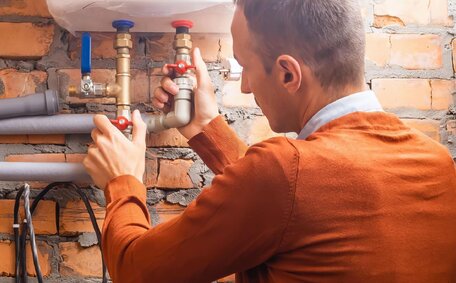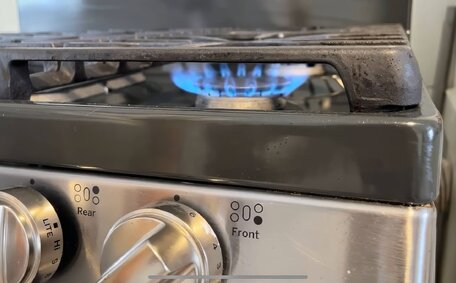Introduction to Cooking with Gas
Cooking with gas stoves offers several advantages for improved culinary experiences. Natural gas stoves and cooktops, already gas-ready, provide immediate and precise temperature control, allowing you to adjust the heat instantly. This responsiveness surpasses electric ranges, leading to quicker boiling, searing, and simmering.
Cooking with LPG is notably versatile, accommodating a broad range of cookware, from stainless steel to cast iron. The open flame allows for cooking directly over flame, as the heat can efficiently cook in a wok or other round-bottomed cookware. The direct flame guarantees rapid and uniform heating for consistent heat distribution.
For residents in Mascot, Sydney, gas stoves are a favoured option for those upgrading their kitchen, also offering the added benefit of functioning during a power outage.
Natural gas appliances usually offer cost-efficiency and a broader spectrum of cooking techniques compared to electric counterparts.
Precise Temperature Control
A key advantage of gas cooktops is their immediate and precise heat setting control. You can easily tweak the heat up or down a notch to get the perfect cooking results.
Gas burners allow you to instantly adjust the size and temperature of the flame, making it faster than electric cooking methods. Gas grants superior control with consistent heat for simmering, searing, stir-frying, and deep-frying.
The steady, easily adjusted flame is ideal for cooking with sensitive materials like stainless steel and cast iron. Gas stoves can also particularly lend themselves well to round-bottomed woks, allowing authentic and even stir frying.
The ability to quickly respond and control the heat makes gas stoves particularly versatile and satisfying to use. Whether using a stove range for boiling pasta, frying eggs or baking a cake, you can finely tune the temperature to achieve perfection every time.
Faster Heating Times
One major time-saving benefit of gas stoves versus electric range models is that gas stoves can bring water to a boil significantly faster. Research shows that gas burners can boil water almost twice as quickly as conventional electric ovens. Consider how much faster, in most gas stove scenarios, it can boil 6 cups of water in just 3.5 minutes, while most electric stove models take around 6 minutes.
This efficiency speeds up boiling water for pasta or vegetables, minimising wait times. Gas stoves provide a clear time-saving benefit, enhancing convenience over long-term cooking.
Gas cooking’s swift heating also allows for more prompt simmering, sautéing, and searing. You’ll enjoy reduced preheating times for your stove top and swiftly achieve the ideal consistency for soups and sauces.
Versatile Cookware Options
Gas range cooktops offer the benefit of compatibility with various pots and pans, promoting kitchen versatility. Gas stoves are gentle on your cookware, working well with materials like stainless steel, cast iron, copper and aluminium.
The open flame can perfectly char food and provide even heat for stir-frying, as flames directly heat the sides of woks. Metal mesh racks placed over the burners are perfect for grilling vegetables or searing meat.
Dual fuel ranges offer both gas and electric options, catering to more sophisticated cooking techniques. You have the control to cook over low or high heat using delicate pans for simmering sauces or ideal heat retention when braising or smoking meat at a steady temperature.
Uninterrupted Cooking During Power Outages
A significant advantage of gas cooktops and ovens is their functionality during power outages, mitigating potential health impacts. Gas appliances rely on NW Natural gas propane lines rather than electricity, so they can still be lit and used manually when the power goes out.
Make sure to consider this significant advantage for public health and your gas ovens in your home during extreme weather events that cause power disruptions in areas like Mascot. Storms leading to blackouts would still allow you to cook meals on your gas range or oven.
Continuous access to cooking facilities ensures meal preparation and sustains comfort and nutrition during electrical blackouts. Whether you’re cooking up a family feast, simmering stews or baking bread, the versatility of gas ensures you can prepare a delicious meal without power.
Gas appliances don’t require rebooting and recalibration when the electricity comes back on. You can simply continue cooking with no disruption. So if reliability during power outages is important to you, gas stoves present a practical advantage.
Comparing Gas to Electric and Induction
The gas versus electric and induction cooking debate encompasses factors like cost, control, efficiency, and environmental impact.
Gas tends to heat more quickly and directly. The open flames provide very precise, immediate control over temperature.
On the other hand, gas ranges are generally less energy efficient than electric induction stove options. They emit greenhouse gas emissions like carbon dioxide and nitrogen dioxide, whose effects gas stoves have on climate change and air pollution is significant.
Electric cooktops, as a different fuel type, use heating coils that gradually transfer heat to cookware. But when it comes to energy consumption, using gas stove may provide cooking advantages that exceed energy savings attributed to electric stoves.
Temperature regulation is less precise than gas, but electric stoves can produce less direct emissions.
Induction ranges use electromagnetic technology to generate heat in suitable cookware.
Ultimately, when deciding between gas and electric options, it boils down to your cooking needs and preferences around cost, control, and environmental impact. Gas offers responsiveness, while electric and induction promote efficiency and cleaner cooking.
Safety Considerations
When cooking with gas, there are a few safety precautions to keep in mind. A range hood exhaust system is essential in sustaining indoor air quality and preventing carbon monoxide accumulation. For best performance and safety, ensure your gas stove is installed and frequently serviced by licensed experts such as Mascot Plumbing.
It’s critical to maintain gas lines, valves, burners, and pilot lights, including annual leak checks with a detection spray. Look for signs like dying pilot lights, popping sounds or strong gas smells.
Avoid leaving food unwatched on the stove during cooking. Keep flammable materials away from the range. Have a fire extinguisher on hand.
Installing detectors is a prudent measure to notify you of hazardous emission levels when using a gas stove.
By following these simple steps and safety tips, you can learn more—call us at Mascot Plumbing to enjoy all the perks of cooking with gas. Check out our services and reach out to get informed about gas cooking benefits and concerns - Mascot Plumbing can help with their expert knowledge across Sydney.
Maintenance Best Practices
To get the most out of your gas appliances and ensure optimal safety, learn more—call us for these maintenance best practices:
- Have a licenced professional inspect your gas line, valves, pilot lights, and burners annually. This can reveal any leaks, blockages or issues before they become dangerous.
- Check the colour of your burner flames regularly. blue flames mean proper combustion, distinct from other cooking methods, while yellow or orange flames indicate a problem.
- Maintain clean drip pans to prevent grease fires, wiping spills quickly after use and using an approved cleaner for any residue.
- Use an approved gas leak detection spray annually to check for leaks around valves, fittings and connections. Watch for dying pilot lights, popping sounds or gas smells.
- Ensure your kitchen is equipped with a range hood to properly vent gas fumes and emissions outside. Range hoods should vent to the exterior, not just recirculate air.
- Install Which can be crucial, install carbon monoxide and gas detectors as an extra safeguard. These will alert you to any dangerous buildup of emissions.
Adhering to these gas appliance maintenance tips will secure your safety and guarantee many years of enjoyable and efficient gas cooking. Contact our team at Mascot Plumbing if you need assistance caring for your gas cooktop or any other gas appliances.
The Convenience and Control of Gas Appliances
As we’ve explored, Gas appliances like stoves and ovens not only offer unrivalled convenience and precise control but can cost less over time, enhancing their appeal. Immediate temperature adjustments enable perfect heat calibration for optimal cooking results, from gentle simmering to rapid boiling. Gas leads the way in speed, outstripping alternate cooking methods and saving precious time.
Gas also enables flexibility in using diverse pots pans to accomplish an array of cooking techniques. This versatility makes gas equally capable for basic family meals or advanced culinary creations.
The open flames are suitable for round-bottomed woks, ideal for intense stir-frying. Or carefully control low temperatures when braising meat or smoking ribs.
The ability to manually operate gas appliances during power outages provides reliable continuity for preparing hot meals when electricity fails. Concerning operational expenses, gas typically incurs lower costs than electric ranges. Over the lifetime of a kitchen, these accumulative conveniences persuade many who prefer gas solutions for their culinary endeavours.
As your local plumbing specialists, Mascot Plumbing offers complete gas fitting services and can advise which gas cooking appliances best suit your needs - To learn more about our services, call us. Contact us or email with any questions about making the switch to gas or maintaining your existing gas appliances.






